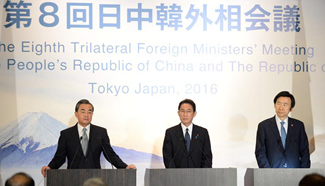BEIJING, Aug. 24 (Xinhua) -- The South Korean-U.S. annual joint war games that kicked off on Monday will further escalate tension on the Korean Peninsula and damage peace and stability in Northeast Asia.
The joint annual war games, scheduled to run through next Friday, was claimed by the two allies to be defensive in nature but considered by Pyongyang as a dress rehearsal for northward invasion.
Only two days after the start of the war games, the Democratic People's Republic of Korea (DPRK) test-fired a submarine-launched ballistic missile (SLBM) off its east coast into the sea.
A South Korean Defense Ministry official said the missile was launched early Wednesday off the eastern coastal town of Sinpo in South Hamgyeong province.
The official also noted that the DPRK's SLBM technology appeared to have advanced compared with previous launches as the missile flew about 500 km toward Japan.
The missile fell into the Sea of Japan, within Japan's air defense identification zone, according to Japanese officials.
Before the joint military drill, Pyongyang had warned Washington and Seoul, calling the exercises the "most undisguised physical measure and provocative action." It also vowed to "foil all hostile acts and threat of aggression and provocation with the Korean-style nuclear deterrence."
This year's South Korea-U.S. war games simulate a wartime joint response scenario, a doctrine that involves a U.S.-South Korea preemptive strike against the DPRK, raising possibility for military conflicts on the peninsula.
Wednesday's missile launch is already the fourth fired by the DPRK since early July. And the South Korea-U.S. military drill might compel Pyongyang to take even more actions and further escalate tension on the Korean Peninsula.
Northeast Asia has already witnessed heightened tension following an agreement between Seoul and Washington in July to deploy a Terminal High Altitude Area Defense (THAAD) missile defense system in South Korea.
The THAAD deployment may accelerate the DPRK's efforts to develop its SLBM technology as THAAD's X-band radar cannot detect and track ballistic missiles fired from a DPRK submarine that moves deep under the waters.
Moreover, China and Russia are strongly opposed to the deployment of THAAD, as its radar can snoop on Chinese and Russian territories, breaking a strategic balance in the region and damaging security interests of Beijing and Moscow.
Some experts also worried that the deployment of THAAD would usher in an era of so-called new Cold War and lead to a fierce arms race in the region.
Related:
DPRK fires submarine-launched missile as S.Korea-U.S. war games kick off
SEOUL, Aug. 24 (Xinhua) -- The Democratic People's Republic of Korea (DPRK) on Wednesday test-fired a ballistic missile from a submarine off its east coast into the sea at a time of heightened tensions on the Korean Peninsula following the start of annual South Korea-U.S. war games, Seoul's military said. Full story
Commentary: S. Korea, U.S. should resume dialogue with DPRK instead of war games
SEOUL, Aug. 23 (Xinhua) -- South Korea and the United States need efforts to resume dialogue with the Democratic People's Republic of Korea (DPRK) instead of being engrossed in war games that escalate tensions on the Korean Peninsula and in Northeast Asia. Full story










